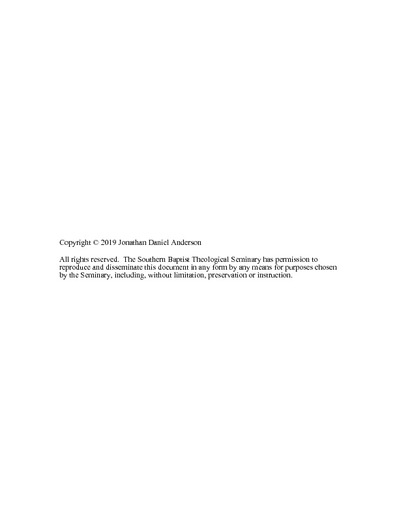| dc.contributor.advisor | Vogel, Robert A. | |
| dc.contributor.author | Anderson, Jonathan Daniel | |
| dc.date.accessioned | 2019-06-05T18:07:01Z | |
| dc.date.available | 2019-06-05T18:07:01Z | |
| dc.date.issued | 2019-05-02 | |
| dc.identifier.uri | http://hdl.handle.net/10392/5831 | |
| dc.description | Ph. D., Southern Baptist Theological Seminary, 2019 | |
| dc.description.abstract | How can the Scriptures stand as the exclusive authority for arriving at a God-given hermeneutic? The Scriptures themselves possess an exclusive hermeneutic that is the only hermeneutic authorized by God for interpreting and preaching the Scriptures themselves—‘the presuppositional hermeneutic.’
Chapter 1 demonstrates the necessity of a revelatory epistemology for certain knowledge. In light of the rise of epistemology in hermeneutics, the discussion about interpretive authority was changed by the Enlightenment. Interpretive authority is more critical than ever, and only a hermeneutic that is built exclusively on a revelational epistemology can claim divine-warrant for correct interpretation.
Chapter 2 develops the first of two arguments for the presuppositional hermeneutic—the first is implicit, the second is explicit. For an interpretation to claim divine-warrant, the hermeneutic must share the same presuppositions as the Scriptures regarding language, meaning, and interpretation. The objections against this argument come largely from those who stand on philosophical presuppositions in addition to the Scriptures. Objections are answered from the Scriptures as interpreted by the Scripture’s own presuppositions about interpretation.
The Scriptures are hard-wired with a hermeneutic that is demonstrated in its inspired interpretation of other passages. The presuppositional hermeneutic is exhibited by the Scripture (ch. 3) as the inspired interpretations of other Scriptures identify meaning with the sense accessible to the original audience (historical) according to the syntax within its literary context (grammatical).
Chapter 4 explains how hermeneutics impact the pulpit. When a hermeneutic lacks divine-warrant, the sermon will as well. The first two sections explore the threats to the pulpit. The chapter concludes with the benefits of the presuppositional hermeneutic for the pulpit.
Appendix 1 examines Kevin Vanhoozer’s interpretive authority, showing the importance of epistemology for hermeneutics.
Appendix 2 examines Martin Luther’s interpretive authority, concluding that Luther did not uphold historical theology as an interpretive authority.
Appendix 3 examines the Redemptive-Historical hermeneutic, concluding that its systematic theology is not textually warranted as a hermeneutical authority. | en_US |
| dc.subject.lcsh | Preaching | en_US |
| dc.subject.lcsh | Hermeneutics | en_US |
| dc.title | The Presuppositional Hermeneutic: An Argument for Interpreting and Preaching the Bible with Authority | en_US |
| dc.type | Electronic dissertation | en_US |
| dc.type | Text | en_US |
| dc.contributor.committee | York, Hershael W. | |
| dc.contributor.committee | Ware, Bruce A. | |
| dc.type.qualificationname | Ph.D. | en_US |
| dc.publisher.institution | Southern Baptist Theological Seminary | en_US |
| dc.publisher.department | School of Theology | |


